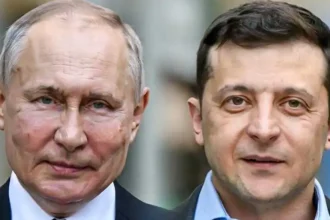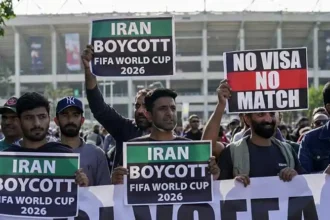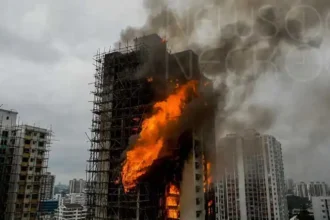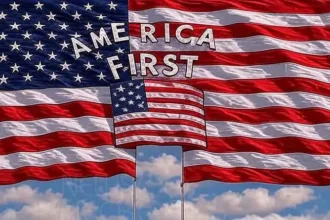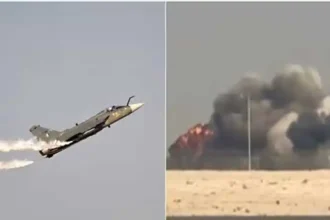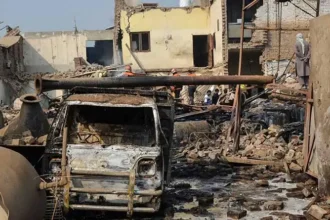A Fragile Truce: US-Brokered Ceasefire Holds After First Major Test
The silence in Gaza is fragile, broken not by rockets or airstrikes, but by the cautious sounds of a tentative peace. A US-brokered ceasefire between Israel and Hamas has survived its first major test, a tense 48 hours that saw both sides accuse the other of violations but ultimately step back from the brink, choosing the path of de-escalation.
The agreement, which took effect earlier this week, faced its most serious challenge when rocket sirens blared in southern Israel on Thursday. The Israeli military confirmed that several projectiles were fired from the Gaza Strip, triggering emergency protocols and sending residents to bomb shelters. For a moment, the entire delicate framework seemed on the verge of collapse.
In a swift response that underscored the fragility of the situation, Israeli artillery targeted the launch sites in Gaza. The world held its breath, anticipating the familiar, grim cycle of escalation. Yet, a full-scale resumption of hostilities did not follow. Instead, channels of communication, heavily reliant on Egyptian and Qatari mediators, buzzed with activity.
Both sides, it appears, were invested in preserving the truce. A senior Hamas official, speaking on condition of anonymity, stated the group remained “committed to the ceasefire agreement” and was investigating the rocket fire, suggesting it may have been the work of a “rogue faction” not acting under their command. Simultaneously, the Israeli Prime Minister’s office released a statement affirming its commitment to the deal but warning of a “severe response” to any further violations.
This immediate, public reaffirmation from both camps was crucial. It signaled to their own people and the international community that despite the flare-up, the will to maintain the ceasefire remained. Behind the scenes, US officials worked the phones, urging restraint and reinforcing the diplomatic gains made.
The Biden administration, which had invested significant political capital in brokering the deal, expressed “cautious optimism.” A State Department spokesperson acknowledged the incident but highlighted the outcome. “The parties have demonstrated restraint. This is what a durable ceasefire looks like it is tested, and it holds. Our focus remains on solidifying this calm and addressing the urgent humanitarian needs in Gaza.”
For civilians on both sides of the border, these first days of quiet have been a precious, if nervous, commodity. In Gaza, families who had been displaced by the fighting began tentatively assessing the damage to their homes and neighborhoods. The constant fear that had defined their existence for weeks began to slowly recede, replaced by a wary hope.
You Might Like it: Trump Hails ‘New Dawn’ in Israel Peace Push 2025:
In southern Israeli towns, children played outside without the immediate threat of sirens, a simple pleasure that had become a distant memory. The tension, however, has not fully dissipated. Many residents remain skeptical, having seen past ceasefires crumble, and are reluctant to believe this one will last.
The success of this truce is seen as a critical first step toward a more lasting solution. The agreement includes provisions for the easing of the Israeli blockade on Gaza, allowing in much-needed humanitarian aid, fuel, and construction materials. It also involves a prisoner exchange, a deeply emotional issue for both Israelis and Palestinians.
The table below outlines the key elements of the ceasefire and its immediate impact:
| Aspect | Details |
|---|---|
| Broker | United States, with mediation by Egypt and Qatar |
| First Major Test | Rocket fire from Gaza followed by Israeli artillery response |
| Outcome | Both sides reaffirmed commitment; no major escalation |
| Humanitarian Impact | Aid trucks beginning to enter Gaza; relative calm for civilians |
| Next Steps | Ongoing talks for prisoner exchange and further easing of restrictions |
Analysts caution that the road ahead is long and fraught with potential pitfalls. “This is the easy part,” said a regional security analyst. “The real challenge is what comes next: negotiating the details of the reconstruction, the prisoner releases, and addressing the core issues that led to this conflict. The ceasefire is a ceiling that stopped the bombing, but the floor is still very fragile.”
For now, the guns are silent. The ceasefire has weathered its first storm, proving more resilient than many predicted. But in the Middle East, peace is often a tenuous proposition, built not just on signed documents, but on the daily, conscious choice to avoid war. The world watches, hoping this choice continues to be made.
Author: Yasir Khan
Date: 20 Oct, 2025
For More Updates, Visit Newsneck






